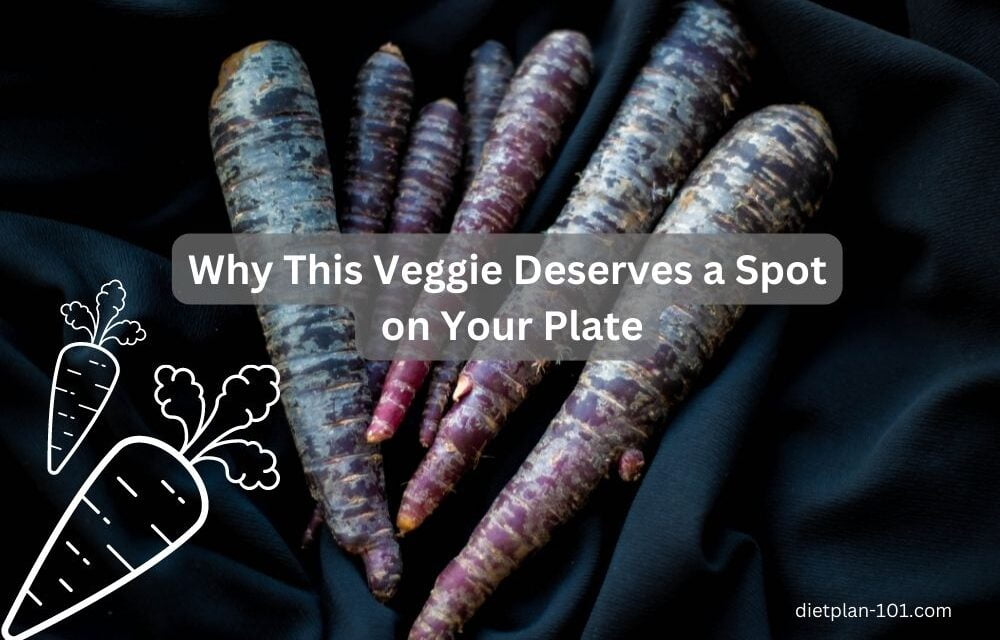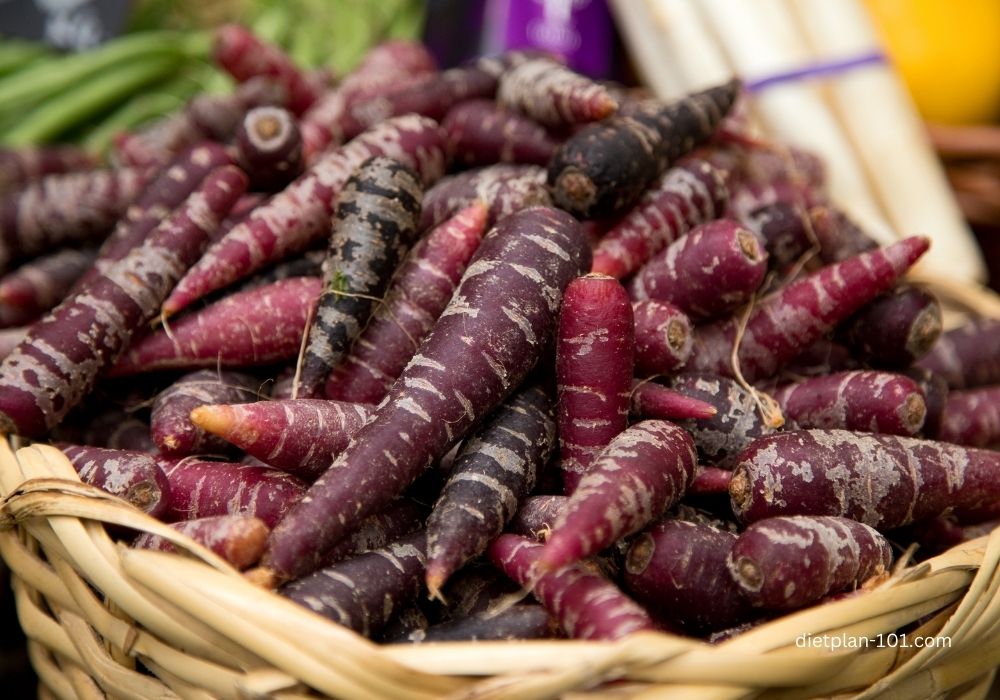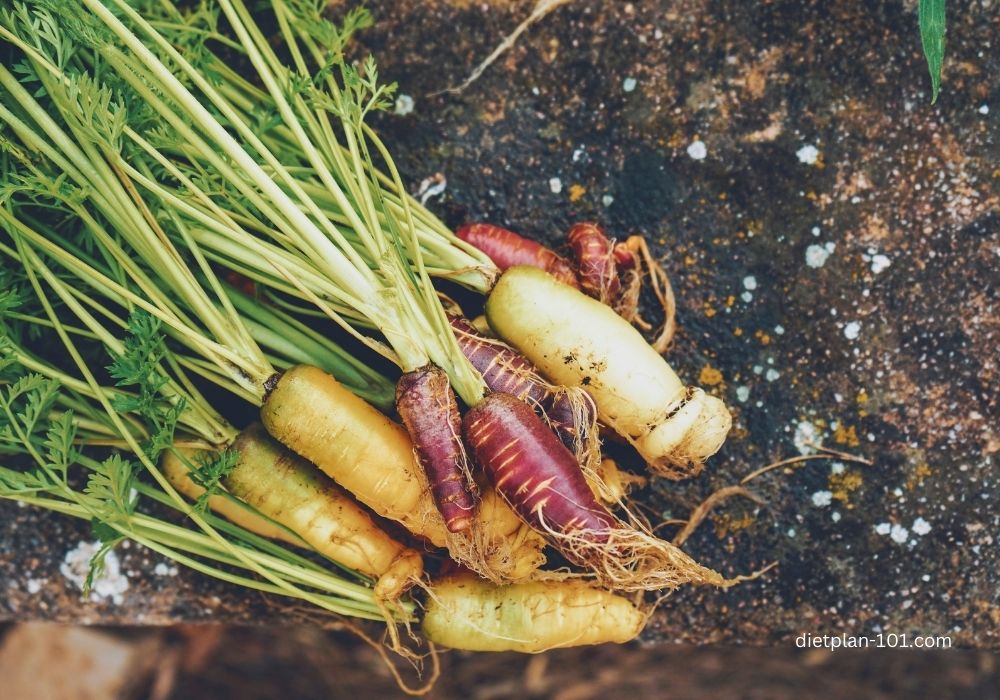When you think of carrots, you probably picture those bright orange or white ones, right? But guess what? The purple carrot was actually the original color of carrot.
While purple carrots may not be as commonly found in grocery stores as their orange counterparts, they offer a range of unique nutritional benefits and a fascinating history that make them worth exploring.
So, in this article, let’s talk about what makes purple carrots so great, where they come from, and how you can start adding them to your meals.
Naturally Occurring: The vibrant purple color of these carrots is not due to genetic modification but rather the presence of naturally occurring anthocyanin pigments.
The Colorful History of Purple Carrots
Purple carrots have a fascinating history, with their origins dating back thousands of years to the regions of modern-day Afghanistan and Iran. These colorful carrots were the norm in ancient times, with orange carrots only becoming popular in the 17th century due to selective breeding. Today, purple carrots are making a comeback as people rediscover their unique taste and nutritional profile.
The orange-colored carrot that we know today was created by Dutch farmers in the 16th century using a process of selective breeding. The orange carrot became popular because it was seen as a symbol of Dutch patriotism, and it eventually became the dominant color of the carrot worldwide.
Is Purple Carrot Healthy? The Nutritional Benefits
Purple carrots are packed with essential nutrients and offer several health benefits. Here are some of the key reasons why you should add them to your plate:
- Rich in Antioxidants: The purple hue of these carrots is due to the presence of anthocyanins, a type of antioxidant that is known to have anti-inflammatory, anti-viral, and anti-cancer properties. These powerful compounds help protect your body from damage caused by free radicals, which can lead to chronic diseases and aging.
- Boosts Heart Health: Purple carrots contain high levels of potassium, which helps to maintain healthy blood pressure and promote overall cardiovascular health. Additionally, the fiber content in purple carrots can help lower cholesterol levels, reducing the risk of heart disease.
- Aids in Digestion: Like their orange counterparts, purple carrots are a great source of dietary fiber, which aids in digestion and helps maintain regular bowel movements. Including fiber-rich foods in your diet can also reduce the risk of developing gastrointestinal issues and promote a healthy gut.
- Supports Eye Health: Purple carrots contain beta-carotene, which is converted into vitamin A in the body. Vitamin A is crucial for maintaining good vision, supporting the immune system, and promoting healthy skin. Moreover, the combination of antioxidants and vitamin A in purple carrots may help reduce the risk of age-related macular degeneration.
- Weight Management: Low in calories and high in fiber, purple carrots can be an excellent addition to your weight loss plan. The fiber content keeps you feeling full for longer periods, helping to reduce overall calorie intake.
Incorporating Purple Carrots into Your Diet
Versatility: Purple carrots can be enjoyed raw, steamed, sautéed, roasted, or used in various dishes, including salads, soups, and stews.
Purple carrots can be enjoyed raw or cooked, just like orange carrots. They can be used in a variety of dishes, including salads, soups, and stews, or simply roasted with a touch of olive oil and herbs. Keep in mind that purple carrots may lose some of their vibrant colors when cooked, but the nutritional benefits remain intact.
7 Vibrant Purple Carrot Recipes to Brighten Your Plate
- Purple Carrot and Apple Slaw: A salad featuring grated purple carrots, thinly sliced green apples, chopped red cabbage, and toasted walnuts. Toss with a tangy apple cider vinegar and honey dressing for a vibrant side dish.
- Purple Carrot Soup: Colorful soup by blending sautéed purple carrots, onions, garlic, and vegetable broth until smooth. Add a touch of coconut milk (optional) for creaminess, and season with fresh herbs, salt, and pepper.
- Roasted Purple Carrots with Herb Gremolata: Roast whole purple carrots with olive oil, salt, and pepper until tender. Top with a zesty gremolata made from finely chopped parsley, lemon zest, and minced garlic for a delicious and visually striking side dish.
- Purple Carrot Stir-Fry: Stir-fry by incorporating thinly sliced purple carrots, along with your choice of protein, bell peppers, snap peas, and onions. Cook in a savory sauce made from soy sauce, garlic, ginger, and a touch of honey.
- Purple Carrot Hummus: Blend boiled or steamed purple carrots with chickpeas, tahini, lemon juice, garlic, and spices. Perfect for snacking or spreading on sandwiches.
- Purple Carrot and Beet Salad: Combine thinly sliced purple carrots and roasted beets with crumbled goat cheese, mixed greens, and toasted pumpkin seeds. Drizzle with a balsamic vinaigrette for a beautiful and flavorful salad.
- Purple Carrot and Lentil Curry: Hearty, plant-based curry by simmering diced purple carrots, red lentils, onions, tomatoes, and spinach in a spiced coconut milk sauce. You may serve it over steamed rice for a warming and nutritious meal.
Juicing purple carrot
To maintain the vibrant purple color of these carrots when cooking, use brief cooking methods and add an acidic ingredient like lemon juice or vinegar during the cooking process.
The Bottom Line
Purple carrots are not only visually appealing but also offer numerous health benefits, making them a fantastic addition to your diet. By incorporating these colorful veggies into your meals, you’ll be able to enjoy the unique taste and impressive nutritional profile of purple carrots while adding a pop of color to your plate. So go ahead and give these nutritious, eye-catching vegetables a try. Happy Cooking!
Purple Carrot FAQ and answer
What is a purple carrot? A purple carrot is a variety of carrot that has a deep purple color due to the presence of anthocyanin pigments. They have a slightly sweeter taste compared to orange carrots and offer a unique nutritional profile.
Where do purple carrots originate from? Purple carrots have ancient origins dating back thousands of years to the regions of modern-day Afghanistan and Iran. They were the most common carrot variety until the 17th century when orange carrots became more popular due to selective breeding.
What are the health benefits of purple carrots? Purple carrots are rich in antioxidants, promote heart health, aid digestion, support eye health, and can help with weight management. The anthocyanins in purple carrots provide anti-inflammatory, anti-viral, and anti-cancer properties.
How do the nutritional values of purple carrots differ from orange carrots? Purple carrots contain higher levels of anthocyanins, which contribute to their deep purple color and provide potent antioxidant properties. They also have a slightly higher amount of potassium compared to orange carrots. Both varieties are rich in dietary fiber, vitamins, and minerals.
How should I store purple carrots? Store purple carrots in a cool, dark place or in the refrigerator’s crisper drawer, away from ethylene-producing fruits like apples and bananas. They can be stored for up to 3 weeks if kept in a perforated plastic bag to maintain proper humidity.
How can I cook purple carrots to maintain their color? To preserve the vibrant color of purple carrots, cook them briefly using methods like steaming, sautéing, or roasting. Adding an acidic ingredient like lemon juice or vinegar during cooking can also help retain their color.
Can I eat purple carrots raw? Yes, purple carrots can be enjoyed raw just like orange carrots. They can be added to salads, used as a colorful garnish, or eaten as a healthy snack with your favorite dip.
Are purple carrots genetically modified? Purple carrots are not genetically modified. They are a naturally occurring variety that has been cultivated for thousands of years.
Where can I buy purple carrots? Purple carrots can be found at farmers’ markets, specialty grocery stores, and some supermarkets. They may also be available through Community Supported Agriculture (CSA) programs or grown in your own garden.
Can I grow purple carrots in my garden? Yes, purple carrots can be grown in your garden just like other carrot varieties. Choose a well-draining soil with a pH between 6.0 and 6.8, and sow seeds directly into the ground in early spring or late summer. Ensure that they receive adequate sunlight and water for optimal growth.









